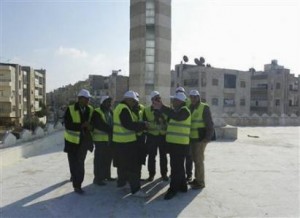 Arab League observers in Syria, depleted by a pullout of their Gulf Arab colleagues, resumed work on Thursday for the first time in a week during which a bloody struggle between President Bashar al-Assad and his opponents has raged on.
Arab League observers in Syria, depleted by a pullout of their Gulf Arab colleagues, resumed work on Thursday for the first time in a week during which a bloody struggle between President Bashar al-Assad and his opponents has raged on.
Security forces deployed across the Damascus suburb of Douma on Thursday, the Syrian Observatory for Human Rights said. Douma, a protest hotbed that has recently seen a rise in rebel activity, was rocked by loud explosions overnight, according to activists living there.
The British-based Observatory said army operations under way in parts of the countryside around the capital had led to fighting on Wednesday night but said there were no signs of clashes in Douma on Thursday since security forces deployed.
The Arab League, while extending the monitoring mission for another month, called on Sunday for Assad to step down as part of a transition plan for which it is seeking U.N. support.
France and Britain have joined efforts at the United Nations to end Assad’s 11-year rule, but Russian Foreign Minister Sergei Lavrov said his country remained opposed to sanctions on Syria and reiterated its opposition to military intervention.
“The U.N. Security Council must support the Arab League’s courageous decisions which are trying to end the repression and violence in Syria and find a solution to the political crisis,” French Foreign Ministry spokesman Bernard Valero said.
The Security Council could vote as early as next week on a Western-Arab draft resolution, council diplomats said.
A group of Arab monitors planned to visit the troubled Damascus suburb of Irbin, one of them said. It would be their first outing since Friday. The mission had put its activities on hold until Arab foreign ministers met to decide its future.
Gulf Arab states have since withdrawn their 55 observers from the 165-strong team, saying they were sure “the bloodshed and killing of innocents would continue”. Arab League officials said they would be replaced and work would go on.
An Algerian observer in the team heading to Irbin said he was nervous because some opposition groups had said they would not cooperate with the mission. “We don’t know what to expect,” he told Reuters, declining to be named.
Another monitor said he was confused about the purpose of prolonging the mission for another four weeks. “The report has been written and the (Arab League) decisions have been taken, so another month to do what? We are not sure,” he said.
RED CRESCENT OFFICIAL KILLED
Syrian opposition groups have accused the observer mission, which deployed on December 26, of giving Assad diplomatic cover to pursue a crackdown on protesters and rebels in which more than 5,000 people have been killed since March, by a U.N. tally.
The head of the Syrian Arab Red Crescent in the northern town of Idlib was shot dead on Wednesday, the International Committee of the Red Cross (ICRC) said, in an attack which Damascus blamed on “terrorists”.
State news agency SANA also said a priest was killed by “terrorists” while helping a wounded person in the city of Hama.
The opposition Local Coordinating Committees activist group said a total of 27 people had been killed, including six fighters in the rebel Free Syrian Army.
The British-based Syrian Observatory for Human Rights put the death toll at 13 civilians and six army deserters.
The state news agency SANA said 14 members of the security forces were buried on Wednesday, describing them as martyrs killed by “armed terrorist groups” across the country. It also said five security men had been killed when a police station was attacked in the town of Apamea in the central province of Hama.
Syrian authorities say insurgents have killed 2,000 soldiers and police since the anti-Assad revolt erupted in March.
Despite the mounting death toll, an ICRC official said the Syria unrest did not meet the group’s definition of civil war.
“The threshold has not yet been passed to speak of an armed conflict,” Beatrice Megevand-Roggo, head of ICRC operations for the Near and Middle East, told Reuters in Geneva.
The ICRC’s legal criteria for civil war include an opposition that clearly controls territory and has a military structure with a clear chain of command.
The revolt in Syria was inspired by other uprisings that have toppled three autocratic Arab leaders over the past year and the bloodshed has battered Assad’s standing in the world.
The Arab League has suspended Syria and called for Assad to hand over to his deputy, pending the formation of an unity government, constitutional and security reform, and elections.
Reuters

Leave a Reply
You must be logged in to post a comment.